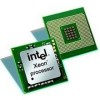Intel X5472 Data Sheet - Page 40
Table 2-19., AGTL+ Bus Voltage Definitions, Table 2-20., FSB Differential BCLK Specifications
 |
UPC - 735858201551
View all Intel X5472 manuals
Add to My Manuals
Save this manual to your list of manuals |
Page 40 highlights
Quad-Core Intel® Xeon® Processor 5400 Series Electrical Specifications The AGTL+ reference voltages (GTLREF_DATA_MID, GTLREF_DATA_END, GTLREF_ADD_MID, and GTLREF_ADD_END) must be generated on the baseboard using high precision voltage divider circuits. Refer to the appropriate platform design guidelines for implementation details. Table 2-19. AGTL+ Bus Voltage Definitions Symbol Parameter GTLREF_DATA_MID, Data Bus Reference GTLREF_DATA_END Voltage GTLREF_ADD_MID, Address Bus Reference GTLREF_ADD_END Voltage RTT Termination Resistance (pull up) COMP COMP Resistance Min 0.98 * 0.667 * VTT 0.98 * 0.667 * VTT 45 49.4 Typ 0.667 * VTT 0.667 * VTT 50 Max 1.02*0.667 * VTT 1.02*0.667 * VTT 55 49.9 50.4 Units V V Ω Ω Notes1 2, 3 2, 3 4 5 Notes: 1. Unless otherwise noted, all specifications in this table apply to all processor frequencies. 2. The tolerances for this specification have been stated generically to enable system designer to calculate the minimum values across the range of VTT. 3. GTLREF_DATA_MID, GTLREF_DATA_END, GTLREF_ADD_MID, and GTLREF_ADD_END is generated from VTT on the baseboard by a voltage divider of 1% resistors. The minimum and maximum specifications account for this resistor tolerance. Refer to the appropriate platform design guidelines for implementation details. The VTT referred to in these specifications is the instantaneous VTT. 4. RTT is the on-die termination resistance measured at VOL of the AGTL+ output driver. Measured at 0.31*VTT. RTT is connected to VTT on die. Refer to processor I/O Buffer Models for I/V characteristics. 5. COMP resistance must be provided on the system board with 1% resistors. See the applicable platform design guide for implementation details. Table 2-20. FSB Differential BCLK Specifications Symbol VL VH VCROSS(abs) VCROSS(rel) Δ VCROSS VOS VUS VRBM VTR ILI ERRefclk-diffRrise ERRefclk-diff-Fall Parameter Input Low Voltage Input High Voltage Absolute Crossing Point Min -0.150 0.660 0.250 Relative Crossing Point Range of Crossing Points Overshoot Undershoot Ringback Margin Threshold Region Input Leakage Current Differential Rising and falling edge rates 0.250 + 0.5 * (VHavg 0.700) N/A N/A -0.300 0.200 VCROSS 0.100 N/A 0.6 Typ 0.0 0.710 0.350 Max 0.150 0.850 0.550 Unit V V V N/A 0.550 + V 0.5 * (VHavg 0.700) N/A 0.140 V N/A 1.150 V N/A N/A V N/A N/A V N/A VCROSS V + 0.100 N/A ± 100 μA 4 V/ns Figure 2-13 2-13 2-13, 2-14 2-13, 2-14 2-13, 2-14 2-13 2-13 2-13 2-13 2-15 Notes1 2,9 3,8,9,11 4 5 6 7 10 12 Notes: 1. Unless otherwise noted, all specifications in this table apply to all processor frequencies. 2. Crossing Voltage is defined as the instantaneous voltage value when the rising edge of BCLK0 is equal to the falling edge of BCLK1. 3. VHavg is the statistical average of the VH measured by the oscilloscope. 4. Overshoot is defined as the absolute value of the maximum voltage. 5. Undershoot is defined as the absolute value of the minimum voltage. 6. Ringback Margin is defined as the absolute voltage difference between the maximum Rising Edge Ringback and the maximum Falling Edge Ringback. 40















